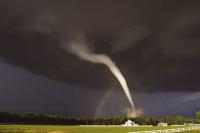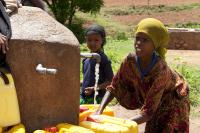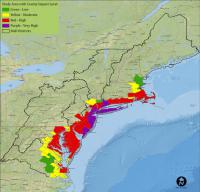-
Applications solicited for funding of next-gen first-response technologies
DHS Science and Technology Directorate (S&T) says that applications are now being accepted through 9 March 2016 for the NextGen First Responder Technologies solicitation, an opportunity for joint-funding by DHS S&T and their partners in the Israeli Ministry of Public Security.
-
-
Groundwater deficit growing in important western U.S. aquifers
By 2050, climate change will increase the groundwater deficit even more for four economically important aquifers in the Western United States, a new report says. Groundwater deficits are expected to worsen in four important aquifers, creating a precarious balance between usage and recharge. The new report is the first to integrate scientists’ knowledge about groundwater in the American West with scientific models that show how climate change will affect the region.
-
-
Outbreaks of extreme tornados have become more common

Most death and destruction inflicted by tornadoes in North America occurs during outbreaks — large-scale weather events that can last one to three days and span huge regions. The largest outbreak ever recorded happened in 2011. It spawned 363 tornadoes across the United States and Canada, killing more than 350 people and causing $11 billion in damage. A new study shows that the average number of tornadoes per outbreak has grown by more than 40 percent over the last half century. The likelihood of extreme outbreaks — those with many tornadoes — is also greater.
-
-
Climate change impact on food production could cause 500,000 extra deaths in 2050
Climate change could kill more than 500,000 adults in 2050 worldwide due to changes in diets and bodyweight from reduced crop productivity. The research, published yesterday in The Lancet, is the strongest evidence yet that climate change could have damaging consequences for food production and health worldwide. The study found that by 2050, reduced fruit and vegetable intake could cause twice as many deaths as under-nutrition, and that three-quarters of all climate-related deaths due to changes in food production are estimated to occur in China and India.
-
-
DHS, DoE, U.S. Army test operational effectiveness of technology solutions
Understanding the true potential of a new technology comes with the opportunity to deploy it in a real life, urban environment scenario against adaptive adversaries. Recently, the Department of Homeland Security (DHS) Science and Technology Directorate (S&T) collaborated with the U.S. Army to assess the operational effectiveness of twenty-five technologies through practical application.
-
-
Making sure that if extraterrestrial observers called, somebody hears
The question of contact with others beyond Earth is hardly hypothetical, as several projects are under way, both to send signals from Earth and to search for signals that have been sent directly or have “leaked” around obstacles, possibly travelling for thousands of years. As scientists step up their search for other life in the universe, two astrophysicists are proposing a way to make sure we do not miss the signal if extraterrestrial observers try to contact us first.
-
-
Water storage strategies in Sub-Sahara Africa

Direct abstraction of water from rivers through ponds and pumping devices seems the most attractive water storage option in Ethiopia. However, the funding agencies that may be interested in investing in such a storage system have to consider that better access to credit, and clear abstraction policies should be ensured.
-
-
In emergencies, don’t trust a robot too much

In emergencies, people may trust robots too much for their own safety, a new study suggests. In a mock building fire, test subjects followed instructions from an “Emergency Guide Robot” even after the machine had proven itself unreliable — and after some participants were told that robot had broken down.
-
-
Calculating monetary losses from floods caused by sea level rise
Damages from extreme events like floods are even more relevant than the mean sea level itself when it comes to the costs of climate impacts for coastal regions. However, while it is now rather well understood how sea-levels will rise in the future, only small progress has been made estimating how the implied damage for cities at the coasts will increase during the next decades. Scientists now provide a method to quantify monetary losses from coastal floods under sea-level rise. For the first time, the scientists show that the damage costs consistently increase at a higher rate than the sea-level rise itself.
-
-
Suicide bomb detector moves close to commercialization with Sandia engineer’s help
On the chilling list of terrorist tactics, suicide bombing is at the top. Between 1981 and 2015, an estimated 5,000 such attacks occurred in more than 40 countries, killing about 50,000 people. The global rate grew from three a year in the 1980s to one a month in the 1990s to one a week from 2001 to 2003 to one a day from 2003 to 2015. R3 Technologies and a group of other small businesses are developing a way to prevent suicide attacks by detecting concealed bombs before they go off. R3 found a partner in Sandia sensor expert JR Russell who has helped bring the company’s Concealed Bomb Detector, or CBD-1000, close to commercialization over the past two years.
-
-
Studying collaboration between research, intelligence communities
In 2013, NC State University and the National Security Agency (NSA) created the Laboratory for Analytic Sciences (LAS) — a collaborative partnership focused on addressing the research challenges associated with “big data.” They soon discovered that a funny thing happens when academic researchers collaborate with the intelligence community: they feel like they are being spied on.
-
-
Fast, lightweight autonomous air vehicle completes first flight data tests
DARPA’s Fast Lightweight Autonomy (FLA) technologies could be useful in addressing a pressing surveillance shortfall. Military teams patrolling dangerous overseas urban environments, and rescue teams responding to disasters such as earthquakes or floods, currently can use remotely piloted unmanned aerial vehicles (UAVs) to provide a bird’s-eye view of the situation, but to know what is going on inside an unstable building or a threatening indoor space often requires physical entry, which can put troops or civilian response teams in danger.
-
-
Autonomous underwater vehicles pre-programmed to make independent decisions
More than 70 percent of the Earth’s surface is covered by water, yet scientists know more about space than about what happens in the ocean. One way scientists are trying to improve their understanding of the marine environment is through the use of autonomous underwater vehicles (AUVs), programmable robotic vehicles that can independently study the ocean and its inhabitants.
-
-
Sea-level rise in twentieth century faster than in any previous century
Global sea level rose faster in the twentieth century than in any of the twenty-seven previous centuries, according to a new study. Moreover, without global warming, global sea level would have risen by less than half the observed twentieth century increase and might even have fallen. Instead, global sea level rose by about 14 centimeters, or 5.5 inches, from 1900 to 2000. This is a substantial increase, especially for vulnerable, low-lying coastal areas.
-
-
New tool for coastal planners preparing for sea level rise

Scientists have developed a new model to help coastal planners assess the risks of sea level rise. Put to use on a global scale, it estimates that the oceans will rise at least twenty-eight centimeters on average by the end of this century — and as much as 131 cm if greenhouse gas emissions continue to grow unchecked.
-
More headlines
The long view
New Technology is Keeping the Skies Safe
DHS S&T Baggage, Cargo, and People Screening (BCP) Program develops state-of-the-art screening solutions to help secure airspace, communities, and borders
Factories First: Winning the Drone War Before It Starts
Wars are won by factories before they are won on the battlefield,Martin C. Feldmann writes, noting that the United States lacks the manufacturing depth for the coming drone age. Rectifying this situation “will take far more than procurement tweaks,” Feldmann writes. “It demands a national-level, wartime-scale industrial mobilization.”
How Artificial General Intelligence Could Affect the Rise and Fall of Nations
Visions for potential AGI futures: A new report from RAND aims to stimulate thinking among policymakers about possible impacts of the development of artificial general intelligence (AGI) on geopolitics and the world order.
Smaller Nuclear Reactors Spark Renewed Interest in a Once-Shunned Energy Source
In the past two years, half the states have taken action to promote nuclear power, from creating nuclear task forces to integrating nuclear into long-term energy plans.
Keeping the Lights on with Nuclear Waste: Radiochemistry Transforms Nuclear Waste into Strategic Materials
How UNLV radiochemistry is pioneering the future of energy in the Southwest by salvaging strategic materials from nuclear dumps –and making it safe.
Model Predicts Long-Term Effects of Nuclear Waste on Underground Disposal Systems
The simulations matched results from an underground lab experiment in Switzerland, suggesting modeling could be used to validate the safety of nuclear disposal sites.
